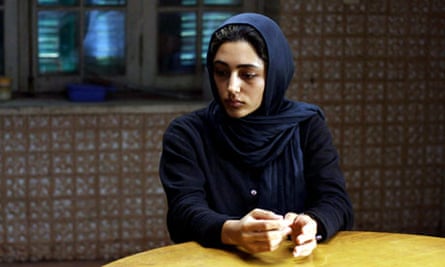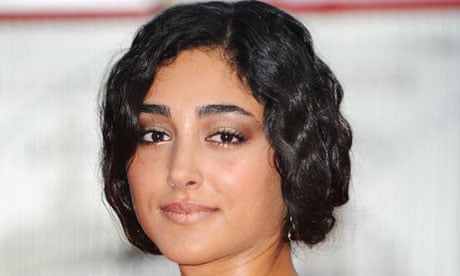In January of this year the parents of the exiled Iranian actor Golshifteh Farahani took a call at their apartment in Tehran from a man who said he was an official of the supreme court of the Islamic Republic. He began shouting at her father, telling him that his daughter would be punished, that her breasts would be cut off and presented to him on a plate.
A few days earlier, Farahani had appeared in a short black-and-white video with 30 other "young hopes" of the French cinema to promote the Césars, the "French Oscars", where she had been nominated for her role in the winsome immigrant comedy Si Tu Meurs, Je Te Tue (If You Die, I'll Kill You). The promo had each actor take off an item of clothing as they stared into the camera to commit their "body and soul" to their art. Farahani chose to bare her right breast, saying: "I will put flesh to your dreams."
What followed in Iran was little short of a cultural earthquake. "It was a catastrophe," she remembers, her head dropping into her hands. "I don't know exactly how many tens of millions of people typed my name into Google the next day, I don't want to know …" A taboo of unimaginable proportions had been shattered, and not by some publicity-hungry provocateur, but by the most loved and admired actor in the country. Farahani may have only been another 29-year-old hopeful in France, but in Iran she became a star the moment she appeared in Dariush Mehrjui's The Pear Tree at 14. Eighteen films later there is more than a little of Garbo, Jeanne Moreau and Irene Papas about her: a rare beauty and intelligence married to a burning emotional honesty in a country where truth of any kind is hard to come by.
In M for Mother she seared herself into the national consciousness playing a pregnant woman gassed during the Iran-Iraq war, abandoned by her husband and now carrying "a gift from God" in her womb. Both rural and urban Iran embraced her as their down-to-earth hero: Golshifteh, the star without airs. Marjane Satrapi, author of Persepolis who directed her in Chicken with Plums, says: "She was not just Iran, she was the mother of Iran."
The day the video was posted, when what she calls the "fire" started, the official Fars news agency in Tehran issued a communique lacerating her, saying that the pictures showed the "hidden, disgusting face of cinema". This kind of opprobrium had never before been poured on an artist, however much they had upset the regime. Her exile was now a banishment.
Farahani had already been banned from working by the Ministry of Culture and Islamic Guidance for not wearing a headscarf at the New York premiere of Ridley Scott's CIA thriller Body of Lies, where, playing opposite Leonardo DiCaprio, she became the first Iranian actress to appear in a Hollywood film since the 1979 revolution.
The film's critical take on the CIA – which overthrew Iran's last freely elected government in 1953 – cut little ice with the ayatollahs, who took her passport away as further punishment. Four years ago, with doors closing all around her amid a pre-election crackdown that would eventually spark the green revolution, Farahani fled to France after being in effect fined the impossible-to-pay sum of €2m. When she spoke out from Paris in favour of the failed green revolution, she was told not to return.

In a final twist of the knife, the censors banned the last film she made there, Asghar Farhadi's About Elly, even before it was shown. Like many before her, Farahani had quietly ignored the ban to take the lead role, hoping it would all blow over.
Strangely, it would never have seen the light of day, nor have won the Silver Bear at Berlin, had it not been saved by an unlikely intervention from President Mahmoud Ahmadinejad himself, who said it was "not fair that a film be condemned by the mistake of one actress".
But that was before she slipped her shoulder out of her shirt with the unconscious air of Delacroix's Liberty Leading the People and became a lightning conductor for the divisions within Iranian society. Ahmadinejad is never likely to be so forgiving again.
Farahani insists, however, that she did not set out to shock or provoke. "I hate politics. It is not my job. As always, something you do for nothing becomes political. I knew it would be difficult. But I am living in France now, I have to work here, and either I am living here or I am not.
"It was a big shock for me and my family and for the whole of Iranian society. The good thing is it started a huge debate that could never have happened before. I was there watching people insult me, others answering them, others defending me, others attacking again.
"There were lots of fights within families. Young people especially saw who they were through this debate, and they saw the reality of people they were trusting in."
The collateral damage was nevertheless immense. Her father, a lion of a man, a communist theatre director and a dissident both under the shah and Khomeini, stopped talking for five days and had to be admitted to hospital after repeated threats. "It was very bad. This was the first time they couldn't support me. The fire was so strong that they were also burning in it.
"I should be careful because I know they are being held hostage … But then after a while, because of the background of my father – who dragged himself up from very humble origins – their feelings began to change. My father was afraid I had lost the support of the people, which is very important to him, because he has spent his whole life battling for the people, sacrificing everything. But after a month or two he saw the people had more respect for me, and he became very happy.
"They even went to a wedding of nomads in the centre of Iran. Everyone from all the generations came to them and held their hands and said: 'Don't be sad. We love Golshifteh.' My mother started crying. That is the beauty of Iran, and that is why I am so proud of being an Iranian, especially the women."
But Farahani doesn't want to be a "Joan of Arc, an actress 'with a story', an exotic victim of persecution. Exile is like death. You cannot understand it until it happens to you. The whole world wants to see you as a victim and they push you to be even more a victim because they see you miserable and they feel good. That is why French people are so obsessed with causes like Syria. It is a kind of pornography to make them feel better about being themselves, but they don't give a shit. They say, 'Come, we will look after you,' and then they fuck you up and don't give you papers. I am just an actor, and I want to work."
That said, she is hugely grateful to France. "For the first time in my life I appreciated being a woman. Paris is a city that liberates you as a woman from all your sins that you think you are guilty of, it washes away all of that and you are free."
She pulls a white scarf around her shoulders. It's her old headscarf, "my old friend". "The biggest problem for Iranian actresses," she says is not the government but the world outside "who think we come out of our mothers with our heads covered".
"Look at Leila Hatami. Normally after winning an Oscar [for Farhadi's A Separation] you get lots of work. But nothing is happening and she speaks four languages."
But Farahani won't be held. She has two more films coming out this autumn in France, a new road movie shot in the US with Sienna Miller, and the almost made-to-measure lead in Atiq Rahimi's The Patience Stone, which he adapted from his own Goncourt prize-winning novel about an Afghan woman standing guard over the body of her husband.
Satrapi compares Farahani to Elizabeth Taylor at her height, but she is a better actor than Taylor: smarter, funnier and more at ease with herself, this is someone who, after spending her childhood welded to a piano, said no to the Vienna Conservatoire.
For like her father, Farahani is a fundamentalist about art. She tells how Farhadi "tortured" her on the set of About Elly, forcing her to break her voice for the part, making her shout at the Caspian sea for half an hour every morning before shooting and swallow chickpea flour so she could only croak and rasp. Her eardrum was perforated in the beating she took from another actor and he refused to let her be treated till they finished the next day. They haven't spoken since. "He's my friend but he cannot talk to me. He is still coming and going from Iran. I am evil now. Paranoia is part of how they control you."
"I have scars from every film I have made," she says, lifting her sleeve and leg to show me. "There is nothing to protect actors. They treat you worse than a dog. You work like a slave, and you know I like it. That is the way it should be. Every film should be like your last."
About Elly is released on 14 September

Comments (…)
Sign in or create your Guardian account to join the discussion